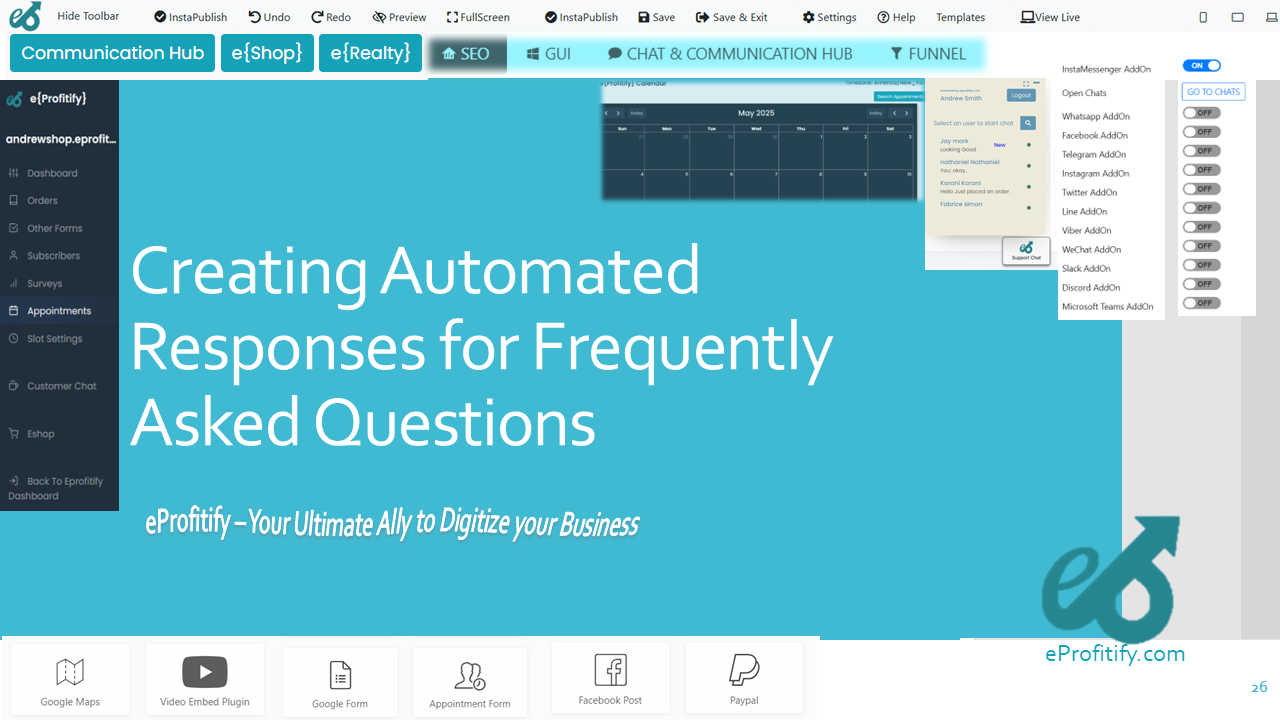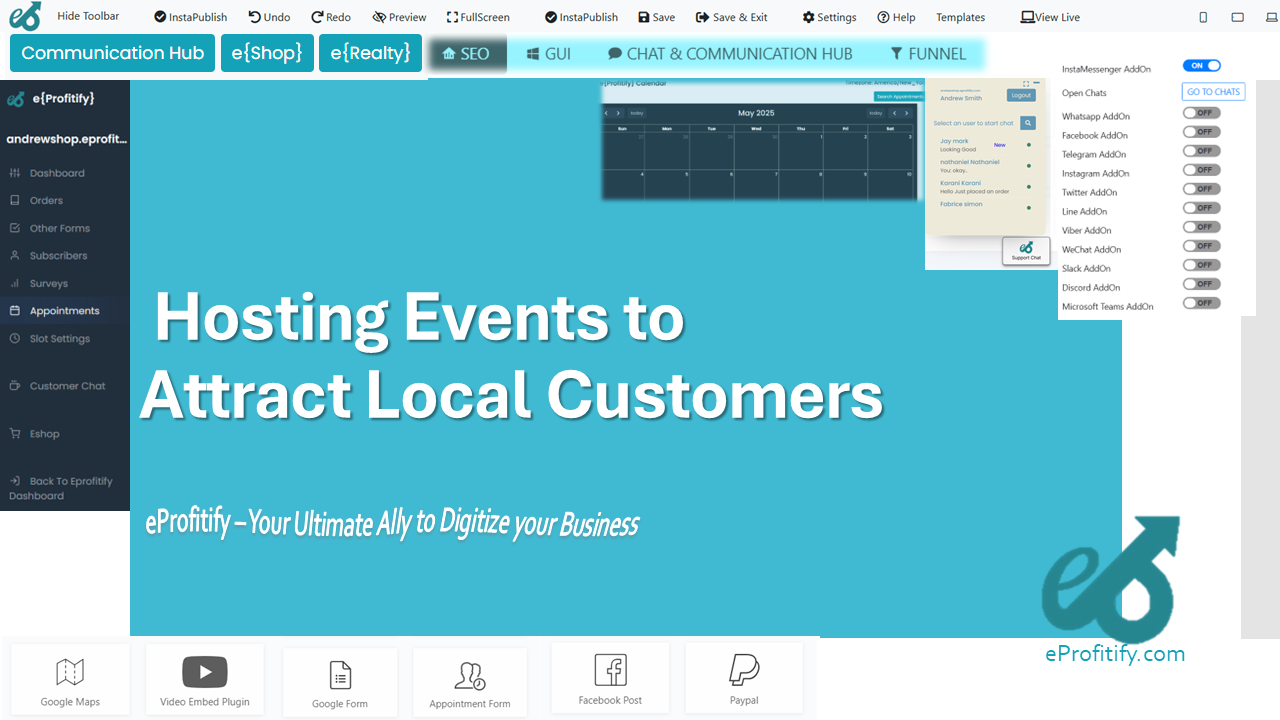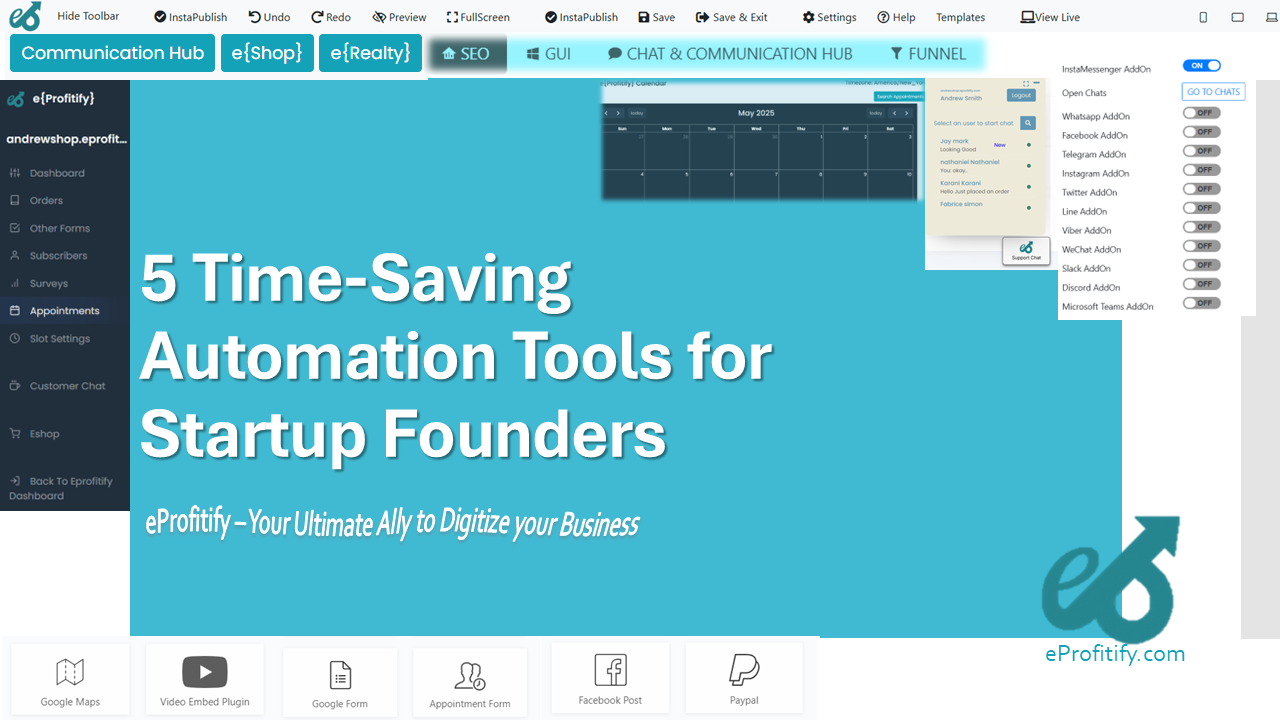Creating Automated Responses for Frequently Asked Questions

Creating Automated Responses for Frequently Asked Questions: Efficiency Meets Customer Satisfaction
In today’s fast-paced digital landscape, customers expect quick, accurate, and consistent answers to their queries. Businesses that fail to meet these expectations risk losing customer trust and revenue. Enter automated responses for Frequently Asked Questions (FAQs)—a game-changer for organizations aiming to streamline customer interactions while reducing operational costs. This article explores the importance of FAQ automation, its benefits, implementation strategies, and how platforms like Eprofitify (a leading website publishing and management tool) empower businesses to deliver exceptional customer experiences through advanced features such as instant messaging, appointment management, CRM, and ecommerce integration.
The Rise of Automated FAQ Systems
Customer service has evolved dramatically over the last decade. With the advent of artificial intelligence (AI) and machine learning (ML), businesses now leverage automated systems to handle routine inquiries. According to Gartner, 85% of customer interactions will be managed without human agents by 2025, up from 48% in 2019. Automated FAQ responses play a pivotal role in this shift, allowing companies to resolve common questions instantly—whether via chatbots, email, or self-service portals.
Consider these statistics:
- 73% of customers expect companies to understand their needs and provide timely resolutions (Salesforce).
- 64% of businesses say AI-driven chatbots free up employees to focus on complex tasks (IBM).
- Automated responses can reduce customer service costs by up to 30% (Harvard Business Review).
Benefits of Automated FAQ Responses
1. Enhanced Efficiency
Automation slashes response times from hours to milliseconds. For example, an AI chatbot can answer questions about store hours, return policies, or product details instantly, allowing human agents to tackle nuanced issues. According to Zendesk, businesses using chatbots handle 70% of inquiries without agent involvement.
2. 24/7 Availability
Unlike human teams, automated systems don’t sleep. Global businesses, e-commerce platforms, and healthcare providers benefit from round-the-clock support. A Forrester study found that 55% of consumers abandon purchases if they can’t find quick answers—a risk mitigated by 24/7 FAQ automation.
3. Scalability
During peak seasons or promotions, incoming queries can surge by 300-400%. Automation scales effortlessly, ensuring consistent service quality without hiring seasonal staff. Amazon reported a 35% reduction in support tickets after implementing AI-driven FAQ responses.
4. Data-Driven Insights
Automated systems collect data on frequently asked questions, customer pain points, and interaction patterns. This information helps businesses refine FAQs, optimize products, and personalize marketing strategies.
Implementing Automated FAQ Systems: Key Steps
1. Identify Common Questions
Analyze historical customer interactions to pinpoint FAQs. Use CRM tools (like those offered by Eprofitify) to categorize queries by topic, such as shipping, payments, or technical support.
2. Choose the Right Platform
Select a platform that integrates seamlessly with existing systems while offering flexibility. Eprofitify, for instance, combines website management, CRM, and ecommerce tools with automated FAQ customization. Its instant messaging feature lets businesses deploy chatbots across websites and social media, ensuring unified communication.
3. Design Responses Carefully
Automated answers must balance brevity and clarity. Avoid jargon, and use natural language processing (NLP) to make interactions feel human-like. For example:
Customer: “How do I track my order?”
Bot: “Hi! Your order status can be checked [here]. Need more help? Let me connect you to an agent!”
4. Integrate Across Channels
Modern customers engage via websites, WhatsApp, Facebook Messenger, and SMS. Eprofitify centralizes these touchpoints, enabling automated responses everywhere while syncing data to its CRM for holistic customer profiles.
5. Test and Iterate
Run A/B tests to refine responses. Monitor metrics like resolution rate, customer satisfaction (CSAT), and escalation frequency. Tools like Eprofitify offer analytics dashboards to track performance in real time.
Eprofitify: A One-Stop Solution for FAQ Automation and Beyond
While many platforms offer chatbot capabilities, Eprofitify stands out as a comprehensive website publishing and management tool tailored for modern businesses. Here’s how its features elevate FAQ automation:
-
Instant Messaging & Chatbots
Deploy AI-powered chatbots that learn from interactions to improve responses. Integrate them with Eprofitify’s CRM to personalize conversations based on purchase history or location. -
Appointment Management
Automate booking confirmations, reminders, and rescheduling. A retail clinic using Eprofitify could auto-respond: “Your appointment on [date] is confirmed. Reply ‘RESCHEDULE’ to change.” -
Ecommerce Integration
Sync FAQ bots with product catalogs to answer inventory-related queries. For example: “Is [Product X] in stock?” triggers a real-time inventory check and delivery estimate. -
CRM Connectivity
Maintain a 360-degree customer view by linking FAQ interactions to client profiles. This enables targeted follow-ups, like sending a discount code after resolving a complaint. -
Omnichannel Support
Manage FAQs across websites, social media, and email from a single dashboard—ensuring consistent messaging and reducing agent workload. -
Analytics & Reporting
Track FAQ performance metrics, such as most-asked questions and customer satisfaction, to refine automation strategies.
The Future of FAQ Automation
As AI grows more sophisticated, automated responses will become even more predictive and proactive. Imagine a system that anticipates customer needs—like sending a tutorial video when a user repeatedly asks about a feature. Platforms like Eprofitify are already paving the way by integrating automation with broader business ecosystems, from sales to inventory management.
Conclusion
Automated FAQ systems are no longer optional—they’re a competitive necessity. By reducing costs, boosting efficiency, and enhancing customer satisfaction, businesses can future-proof their operations while delivering memorable experiences. Tools like Eprofitify amplify these benefits by offering an all-in-one platform for website management, CRM, ecommerce, and intelligent automation. In a world where speed and accuracy reign supreme, investing in FAQ automation isn’t just smart; it’s essential for survival.
Statistics Recap
- 85% of customer interactions will be automated by 2025 (Gartner).
- 55% of consumers abandon purchases without instant answers (Forrester).
- FAQ automation reduces costs by 30% (HBR).
By leveraging Eprofitify’s suite of tools, businesses can turn FAQs from a operational burden into a strategic asset. Whether you’re a small e-commerce store or a multinational enterprise, the future of customer service starts with smart automation.







